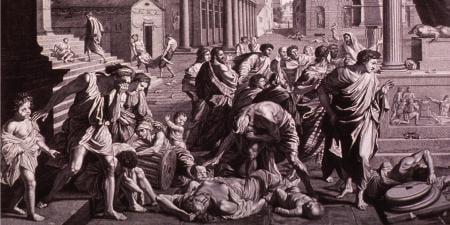Imagine that Joseph, a 21-year-old student at a state university in Illinois, is spending 3 months in China for a summer study program abroad. While he is there, severe acute respiratory syndrome (SARS) breaks out in Canada and is traced back to China.
When SARS shows up in Canada, Illinois immediately creates a mandatory vaccine for all those who are currently in China or certain areas of Canada, or all those who plan to go there in the next few years. The new vaccination is commonly believed to be effective and is widely approved by the medical community. However, some in the medical community believe that the vaccination is worthless in preventing the spread of SARS and that it has injurious side effects.
Joseph feels confident that he will not contract SARS. He has been in China for a month, is perfectly healthy, and is not in the region of the outbreak. He is willing to submit to a physical but does not want the “experimental” vaccination and its side effects. He also feels that this mandatory vaccination affronts his bodily integrity and violates his 14th Amendment rights.
Discussion
The 14th Amendment asserts that no state shall make or enforce any law abridging the privileges or immunities of citizens of the United States or deprive any person of life, liberty, or property without due process of the law[1]. The Supreme Court recognizes a 14th-Amendment guaranty of substantive due process that protects US residents against arbitrary legislative actions; this constitutional guarantee requires that legislation not be unreasonable, arbitrary, or capricious and that it have a substantial relation to the legislative objective [2]. Essentially, though, this provision demands only minimal scrutiny or rational review of the enacted legislation; the law need only be rationally related to a legitimate government purpose to be declared constitutional. Further, the Supreme Court has recognized each state’s “police power,” which gives the state authority to enact health laws of every description, including quarantine and vaccination laws, to protect its citizens [2].
In 1905 the Supreme Court addressed mandatory vaccinations in regard to smallpox in Jacobson v Massachusetts [2]. There the Court ruled that the police power of a state absolutely included reasonable regulations established by legislature to protect public health and safety [2]. Such regulations do not violate the 14th Amendment right to liberty because they fall within the many restraints to which every person is necessarily subjected for the common good [3]. Real liberty for all cannot exist if each individual is allowed to act without regard to the injury that his or her actions might cause others; liberty is constrained by law. The Court went on to determine in Jacobson that a state may require vaccination if the board of health deems it necessary for public health or safety [4].
When determining the legality of a statute enacted to protect public health and safety, the Court found it immaterial that a portion of the medical community thought the vaccination worthless or even injurious. The state has the right to choose between opposing medical theories and to refer the matter to a board composed of persons residing in the affected location who are qualified to make a determination. The courts do not become involved in legislation formed under the state’s police power as long as it relates substantially to public health, morals, or safety and is not a plain, palpable invasion of rights secured by fundamental law [5]. Furthermore, it is immaterial whether or not the vaccine is actually effective, so long as it is the belief of state authorities that the mandatory vaccine will promote common welfare and is a reasonable and proper exercise of the police power [6]. It is of paramount necessity that a community have the right to protect itself from an epidemic of disease which threatens the safety of its members.
The Court decision in Jacobson v Massachusetts is just over 100 years old and has not been revisited in any meaningful way. The Court follows the doctrine of stare decisis, which directs it to follow existing judicial decisions when the same points arise in litigation unless there is sufficient justification for departing from precedent [7]. In this case the Jacobson Court’s ruling has stood—not allowing a single individual to refuse vaccination while he or she remains within the general population on the grounds that to make such an exception would strip the legislative branch of its function to care for the public health and safety when threatened by epidemic disease [8]. This ruling prevails despite occasional injurious results from vaccinations and the impossibility of determining whether a particular person can be safely vaccinated. The only exception to a mandatory vaccination is an offer of apparent or reasonably certain proof to the state’s board of health that the vaccination would seriously impair health or probably cause death [8].
Consequently, our student, Joseph, does not have a valid argument against the mandatory vaccination. It is established that vaccination to prevent an epidemic is well within the police powers of Illinois. Furthermore, he does not have a 14th Amendment liberty or due process argument because the vaccination is for the health and welfare of the state. Lastly, even if Joseph had a religious objection, it would most likely be dismissed because a compelling state interest may abridge religious freedom [9].
References
-
US Const. Amend. XIV, §1.
-
Jacobson v Massachusetts, 197 US 11, 25 S Ct 358 (1905).
-
Ibid, 26.
-
Ibid, 27.
-
For instance, a state may abridge religious practices only when there is a compelling state interest and the law is substantially related to protecting this interest. Religious practices fall under strict scrutiny (as opposed to rational review), which is a higher standard of scrutiny because religious freedom is a fundamental right protected by the 1st Amendment. See for example, McDaniel v Paty, 435 US 618, 698 S Ct 1322 (1978).
-
Jacobson, 197 US, 35.
-
Black HC, Garner BA, eds. Black’s Law Dictionary. 2nd pocket ed. St Paul, Minn: West Publishing Co.; 2001:661.
-
Jacobson, 197 US, 38.
-
See McDaniel, above. However, because the 1st Amendment receives strict scrutiny, the state would have to show that there is no other, less-intrusive method to accomplish their objective.



